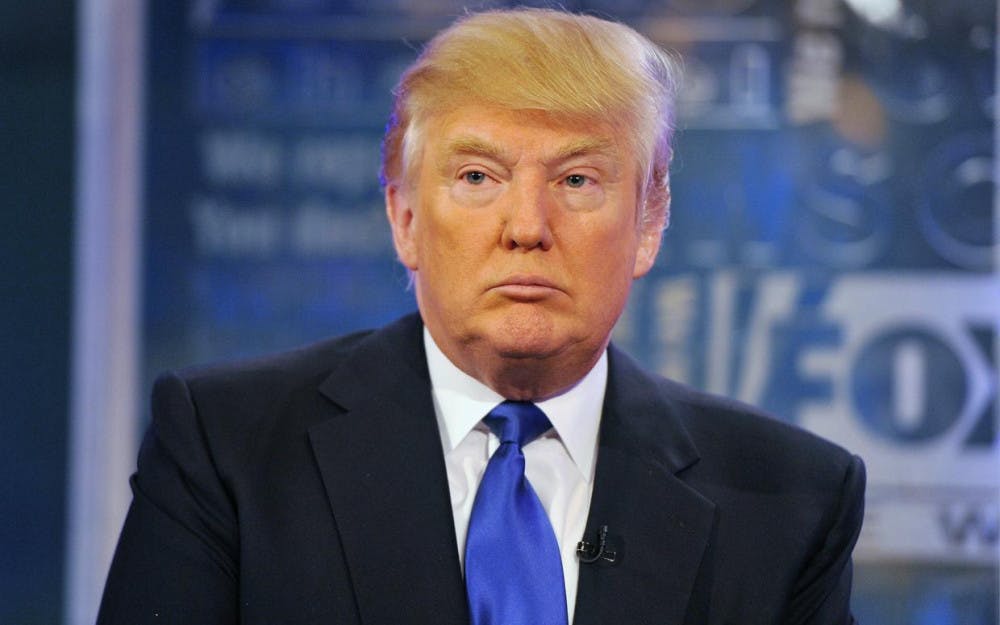Five months before the 2016 presidential primaries officially begin with the first votes in the Iowa caucus, the Republican Party has an unorthodox and unexpected front-runner.
New York businessman Donald Trump, a billionaire real-estate mogul who has stamped his name on everything from neckties to skyscrapers, has surged to the top of the GOP field and taken a com- manding lead over the previous front-run- ner, former Florida Gov. Jeb Bush, Re- publican. Trump’s rise occurred quickly. From the announcement of his candidacy on June 16, it took merely a few weeks for his support to swell enough to propel him into first place in a crowded field of 17 candidates.
By the time of the first nationally tele- vised GOP debate, Trump held a 12 point lead over Bush — a lead which defied all conventional wisdom and continued to not only hold, but grow, while Trump made very controversial remarks and drew fire from several fellow candidates.
During his announcement speech, Trump claimed that the majority of undocument- ed immigrants entering the United States are murderers and rapists, conceding that “some” are probably good people. These comments drew sharp criticism from oth- er GOP candidates, but neither the com- ments nor criticism hurt Trump’s standing in the polls. And Trump found himself polling in the top tier of candidates soon after the comments.
Likewise, many predicted that his cam- paign’s demise was imminent after he criticized Sen. John McCain’s, R-AZ, war record by saying that McCain is seen as a war hero because he was captured in Vietnam, and that he (Trump) “likes people who weren’t captured.” Again, the comment drew sharp criticism, and again, Trump’s position in the race improved — after his comments about Sen. McCain, Trump’s lead grew larger.
The fascinating aspect of Donald Trump’s 2016 presidential campaign is that, through the first two months of the primary news cycles, controversy has not weakened it. All the controversy has made Trump’s polling numbers increase. The resiliency of Donald Trump thus far highlights a very difficult problem that the Republican Party must resolve and do so quickly. The party establishment’s desire to nominate a more moderated, centrist candidate to challenge likely Democrat nominee Hillary Clinton is not shared by many of the GOP primary voters, who see Trump as a no-nonsense tough guy with a contempt for the elitist political class.
Trump’s rise in the GOP primary doesn’t seem to be about ideology. Just a decade ago, Trump supported partial-birth abor- tion, single-payer healthcare and consid- ered himself a Democrat. Two years ago, he supported a pathway to citizenship for undocumented immigrants, yet now he proposes mass deportation.
Curiously, Trump has faced none of the difficulties relating to flip-flopping that plagued 2012 GOP nominee, former Gov. Mitt Romney, R-MA. Also, his rise does not appear to be about substance — of which Trump has offered little. For exam- ple, his solution for reforming health care is to repeal Obamacare and replace it with “something terrific.” Instead, it looks like Donald Trump’s current success is due to his lack of concern for political correct- ness. His willingness to speak his mind bluntly and without a filter has, thus far, persuaded a plurality of Republican voters to overlook his lack of ideological purity, consistency and policy substance.
Eventually, Donald Trump’s rise in the polls will slow and stop. Sooner or later, he will reach his ceiling of support — be it 25 percent, 30 percent or 40 percent. When that happens, Trump will either have enough support to defeat the few remaining GOP candidates, or he will be overtaken in the polls and lose the GOP nomination.
Trump appeals to a very particular type of voting bloc, and it seems unlikely that he could expand his support beyond that by building a coalition.
if he loses, the outcome of the 2016 race may rest in Trump’s hands. He has refused to rule out the possibility of an independent campaign in the general election. It’s unclear exactly what impact a Trump independent candidacy would have, but many Republicans fear that it would divide the Republican vote and assure a Democratic victory. This would give Trump quite a bit of leverage with the Republican Party, and something to keep in mind as the 201





